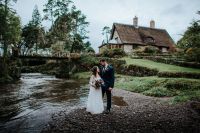Ireland is called the Emerald Isle because of its dramatic cliffs, vast forests and valleys covered in vibrant vegetation, carefully preserved century-old castles, estates surrounded by mountains and lakes, clifftop locations, and castle ruins with stunning views of the Atlantic Ocean! You just can’t go wrong by choosing Ireland for your destination wedding in Europe.
Our Packages for Ireland
Customized packages for Ireland weddings, elopements and vow renewals, arranged by our local destination wedding planner and tailored for your needs.
Small Wedding
Designed for couples who dream of a small wedding in Ireland with an intimate guest list of up to 60 people, in exclusively-hired venues which can include accommodation, ceremony and reception areas, plus catering to complete your destination wedding.
Elopement
Achieve utmost intimacy by having a private ceremony with a few of your closest friends and family members. Let us help you craft the perfect wedding package for your elopement in Ireland so all that you’ll be left to do is show up!
Vow Renewal
Pick from one of the breathtaking wedding venues in Ireland where you can renew your vows, while making your couple travel goals come true at the same time! Our Irish wedding packages include a vow renewal option for adventurous couples like you!
Bespoke vs. Package
Bespoke
If you’re a couple who wants to have full control of the design of your celebration, a bespoke wedding planning solution might be the most suitable way for you to plan your big day. This option is best if you have a flexible budget with wiggle room for unexpected expenses and last minute must-haves, or a large guest list that required more in-depth management. It usually takes more time to plan a bespoke wedding compared to booking a wedding package because of the nitty gritty details you have to dive into with your wedding planner. But if you’re in for a creative and adventurous journey to craft your special day down to the last detail, then a bespoke wedding can be right for you.
Package
We specialize in creating memorable and completely stress-free destination wedding experiences for our couples by offering you a simple and cost-effective solution: customizable wedding packages. Our packages for elopements and intimate weddings in Ireland are designed to make wedding planning easier and with more predictable costs versus a bespoke wedding. Just pick your selection of required services, reserve your wedding date to lock in a fixed price for your entire wedding package - then simply enjoy the warm feelings of anticipation and excitement until your big day finally comes around!
Your destination wedding planners in Ireland
Let our responsive, accommodating, and experienced wedding planner in Ireland gives you top-notch assistance from the early stages of your wedding planning to the day that you step foot on The Emerald Isle for your special day.

Originally from Arizona, Hattie fell for Ireland (and an Irishman) and has called it home since 2015. She’s always on the lookout for the island’s next best-kept-secret spots.
Couples' reviews

Amazing experience! We did a small elopement in Ireland after having to cancel our original wedding plans due to COVID. We ended up loving our small cliffside ceremony better than any large wedding we had planned previously. Aine was amazing and all the vendors we worked with were so warm and kind. The day was full of joy and laughter and it was really a one of a kind experience. Everyone that went kept talking about how beautiful it was. Sean, who owned the venue, even gifted everyone with ice cream after the ceremony. So many happy memories were made :)
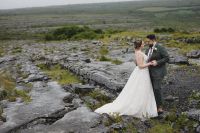
Aine and the team at Peach Perfect Weddings made our day full of magic and love. After having to postpone our original date due to the pandemic, Aine swiftly and graciously navigated changing vendors, guest numbers, and everything in-between. All of the suppliers that she chose for us were incredible, and collaborated with us to make our day so special for us and our guests. We're so grateful to Aine, the suppliers, and Peach Perfect Weddings for crafting and sharing our day, xx.
Reasons to get married in Ireland
Fairytale castle venues
We automatically recommend Ireland when we see the words ‘fairytale wedding’ in an email enquiry. That’s because Ireland boasts of delicately preserved castles with classy interiors and wide open lush green spaces outside. Many of which have lush gardens that are perfect for brides who are looking for an outdoor elopement venue with vibrant nature and a castle backdrop. If you’re worried about the uncooperative Irish weather, the interiors of these castles won’t disappoint. They all have that classic ambience of a royal residence to give you gorgeous photos for your indoor castle wedding.
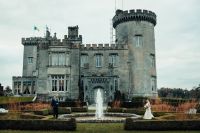
Historic ruins
For history fanatics who have always dreamt of a handfasting ceremony inside an ancient ruin, Ireland is definitely the perfect wedding destination for you. The memories of Ireland’s rich history are reflected in these abandoned castles, churches and old monasteries which are perfect elopement spots for your dream wedding. These ancient ruins are some of the most unique locations for a wedding ceremony with a historic ambience.

Breathtaking nature
It’s no surprise that dramatic cliffs and beaches are some of the top natural spots for a micro wedding in Ireland. Imagine walking down the three-mile-long beach of the Atlantic coast and having your photos taken with such a romantic and peaceful ambiance. Say your vows while feeling the breeze and hearing the ocean on the background, not to mention the scenic backdrop of the horizon that cuts between the turquoise waters and blue skies. For something more extraordinary, travel to a natural wonder that is known for the basalt columns deposited underneath the ocean from a volcanic eruption some million years ago. If you want a wooded environment for your Ireland elopement, you can have a ceremony in a nature park or a serene forest with healthy vegetation and softly rushing streams.

Lush green landscape
Adventurous couples who are looking for a unique outdoor wedding venue would love to get married surrounded by the evergreen Irish landscapes and heavily wooded forests. You can recite your vows in natural wedding location with tall trees and a healthy foliage. Some of these outdoor venues are on flat ground, but the most stunning of all are on the cliffs overlooking the Atlantic Ocean. If you want to make the most out of your micro wedding, then choose an elopement on the Cliffs of Moher and say your vows thousands of feet above the ocean.
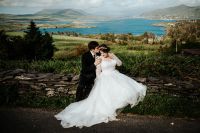
Beaches and lighthouses
Although Ireland does not have a beach-friendly climate, it is gifted with ocean landscapes that compete in beauty with some of the best in the world. For a relatively small country, Ireland is home to a total of 80 Blue Flag beaches. Kerry and Donegal take 1st and 2nd place as the counties with the highest number of Blue Flag beaches. These not-so-crowded beach scenes are ideal for an intimate beach wedding in Ireland. Alongside the scenic Irish beaches are lighthouses that keep the island and it’s vessels safe on the darkest and stormiest nights. Say your I do’s here for a romantic wedding ceremony with ocean views.

When to have a destination wedding in Ireland
Winter
The winter months of December, January and February are best reserved for couples seeking a ‘hideaway’ atmosphere for their wedding day and exchanging their vows in front of a roaring fire. Outdoor wedding ceremonies are not recommended during this time of year, as chances of adverse weather are too high. Instead, snuggle up to your beloved under heavy feather blankets and celebrate your destination wedding in a grand hall or dining room with a big open fireplace and plush interiors.
Autumn
Next to spring, autumn is the best season to get married in Ireland because tourists and local vacationists start to head home at this time. Thus, you can expect dropping rates of Irish wedding venues and lesser crowds on the beaches and other destination spots when the autumn season arrives. If privacy and a peaceful ambience means so much to you, then it’s best to schedule your wedding in Ireland on the month of September or October.
Summer
Summer time in Ireland begins on the month of July and lasts until mid-September. At this time, the temperature reaches up to 20 degrees Celsius and daytime can last for as long as 18 hours! That makes this season a great time to elope in Ireland when the lush green landscapes are perfectly lit until almost 10 in the evening. But one thing to note is that summer is the traditional holiday season in Ireland so you can expect an influx of tourists, as well as locals enjoying the beaches and vacation spots all around the country.
Spring
Spring is the best time to catch the blooming flower fields and fresh foliage that covers the parks, cliffs, and garden wedding venues in Ireland. The temperature during this season remains mild at 8 to 12 degrees Celsius so it’s still wonderful to have an outdoor wedding ceremony with a vibrant backdrop of flowers in full bloom. If you wish to get married in a natural spot here in Ireland, late spring is the best season to do it.
Types of wedding venues in Ireland
Castles everywhere
Fully functioning castles occupy more than half of our list of wedding venues in Ireland, easily outnumbering all other types of venues. These operational castles have an imposing medieval facade and were built as far back as the 16th-century. Despite their age, they were carefully preserved by the owners, keeping their classy palatial interiors and features. Many have been upgraded into luxury castle hotels, some now house a museum whilst others are available for private holiday rentals and exclusive wedding hire. All these castles are located in scenic regions - some with panoramic views of the mountains, green fields, parklands and woodlands. They are outstanding choices for couples who want an intimate destination wedding or an elopement for two in a unique Irish venue.
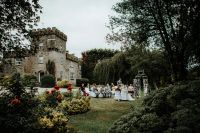
Dramatic ruins
Speaking of castle ruins, these ancient structures also have a facade that makes for a stunning dramatic backdrop for a wedding ceremony in Ireland. Some of our couples loved the idea of exchanging vows inside these derelict churches and castles with thick green foliage crawling on the walls, giving life to these abandoned pieces of history. Here in Ireland, castle and church ruins are preserved, protected and kept clean so locals and tourists can visit them as to look back on the eventful past of the Irish people. But more than visiting, couples can also hold an elopement ceremony for two or an intimate wedding with no more than a handful of guests in these magnificent locations.
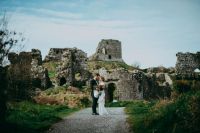
Boutique hotels
Far from the ordinary boutique hotels in other urban European cities, Irish boutique hotels are typically family-owned and small but stylish and unique! Despite their smaller size, these modern wedding venues offer incredible outdoor landscapes, amazing food and impeccable customer service. Outdoor micro weddings can be held in the hotels’ gardens, beneath the trees of their private forests or on lush lawn overlooking serene bodies of water. In front of the outdoor ceremony spot are towering trees of the forestland fronting the hotel.
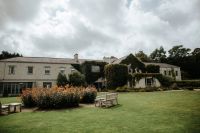
Rustic wedding venues
The charm and cosy atmosphere of a rustic wedding venue never goes out of style. There are couples from across all generations who prefer this type of venue for it’s relaxed and homely ambience, nature-inspired textures, peaceful setting and quirky elements of decor. Luckily, Ireland is bursting with gorgeous rustic wedding venues like woodland lodges, traditional cottages and country houses enclosed in vast estates that can be exclusively rented for your destination wedding in Ireland.

Beaches and cliffs
Ireland is bordered on the west by scenic cliffs overlooking the northern Atlantic Ocean. This is where you’ll find the popular Cliffs of Moher which is fast becoming a top elopement venue in Ireland in terms of popularity. This outdoor wedding location is perfect for couples who want a dramatic setting for their ceremony. Similar stunning views await you on the east coast of Ireland, just a short drive from Dublin city, at the Howth Head peninsula overlooking the Irish Sea. For a more peaceful and less touristy exchange of vows, travel to Slea Head or the Kerry Cliffs of Portmagee in the South West of Ireland. The coast of County Donegal is also well worth considering if you’re not much interested in sharing your big day with hundreds of tourists.

Traditional Irish pubs
Want something truly unique for your wedding in Ireland? Have a post-ceremony reception in a local pub that offers a raw and authentic Irish wedding experience. The highlight of all Irish wedding receptions is the toasting ceremony when the couple would drink one of the many varieties of authentic Irish beers, but the beer of choice is typically Guinness! There’s one traditional Irish pub in Co. Clare, located just a stone’s throw away from the Cliffs of Moher, that specialises in hosting pub weddings. This family-owned pub has been serving locals and tourists since the 1980’s and its rustic wedding Barn is is a popular wedding venue both with locals and destination couples alike! Incorporating the Irish pub scene into your big day is a fantastic way to embrace your chosen wedding destination.

Wedding ceremonies in Republic of Ireland
Civil
A civil ceremony is the most common type of wedding ceremony in Ireland. It’s performed by a Registrar from the local Civil Registration Office and is subject to a number of restrictions. A civil wedding in Ireland can only be be held indoors, at a licensed wedding venue and officiated by a Registrar on a regular working day from Monday – Friday. Civil ceremonies follow a specific format and are not very flexible in terms of changes and personalisation.
Humanist
Some couples prefer a non-religious and non-denominational ceremony, but want more freedom of choice for their wedding venue and day of the ceremony. The good news is that a few years ago, Ireland recognized this type of wedding to be legally-binding. A ceremony like this is definitely more relaxed and free-flowing, without strict requirements except that it should be performed by a Humanist ceremony officiant and include the “no impediments to marriage” and “I do” declarations required for the ceremony to be legally sound. It can also take place in any indoor or outdoor location of your choice that is open to the public.
Spiritual
Despite the name, spiritual ceremonies have no affiliation with any religion. In fact, this is a non-denominational type of wedding that is not too different from a Humanist ceremony. It does not follow any religious rituals and these ceremonies are officiated by a Spiritualist Union of Ireland member. Spiritual Ceremonies can be both symbolic or legally-binding, and they can take place on any day of the week and in any location, whether the location holds a wedding venue licence or not.
Secular
The traditional meaning of a secular wedding specifies any type of non-religious or non-denominational type of ceremony. By this definition, both Humanist and Spiritual types of ceremonies can be considered Secular. However, in Ireland, we can consider a Secular ceremony the type of a ceremony which draws it’s format from pagan Celtic traditions. Although these are few and far between, there are a small number of Secular Officiants, also known as Celtic Priests, who are licensed Solemnisers capable to performing a legally-binding wedding ceremony in Ireland.
Religious
Another commonly preferred type of legally-binding ceremony is a Catholic wedding in Ireland. If you’re having this type of ceremony, you will be required to follow the rules of marriage as outlined by the Catholic Church. One such requirement is for the couple to undergo a pre-marital course. This type of ceremony is officiated by a Catholic Priest and can only take place in a consecrated church or chapel.
Symbolic
Just as the name suggests, a symbolic wedding is one that carries no legal weight. This type of ceremony is also commonly referred to as a ‘blessing ceremony’ whereby the couple, who may or may not be already legally married, chooses to have a meaningful ceremony to celebrate their union in a non-restrictive format of their choice. Couples who cannot or do not want to complete the requirements to have a legally-binding wedding in Ireland often choose a Symbolic ceremony for its simplicity and freedom for personalisation.
Legal marriage requirements in Republic of Ireland
Couples wishing to have their marriage legally registered in Ireland must submit their marriage notification at least 3 months ahead of their intended wedding date. Although the submission is usually required to be made in person, non-residents are granted permission to submit copies of their documents by post, subject to the couple attending a face-to-face meeting with the Registrar a minimum of 5 working days before the wedding date. Documents must arrive at the Registrar's office by the 3 month deadline in order to be accepted, so postal times must be considered too. Here's a detailed guide about having a legal wedding in Ireland.
Popular Irish food and drinks
Guinness

Just like you wouldn't marry in Italy without pasta, or in France without champagne, a successful wedding in Ireland must include a hearty pint of Guinness. This much loved beverage all over the world is considered a staple in Ireland. The people not only love to drink Guinness, but it's also used as a not-so-secret ingredient in many local dishes and even baked goods. From beef stew to chocolate cake - Guinness goes with everything!
Soda bread and potatoes

Ireland dishes are inspired by the farm life because it has always defined the lifestyle of the local people. An Irish wedding reception usually starts with soda bread. These rich soda bread slices are made perfect by a selection of flavourful cheeses that are served along with them.
The Celtic main course

If you’d ask any Irish about the best stew they grew up with, they would say, it’s that large pot of lamb stew with bacon bits! You can have this served for dinner in your wedding in Ireland with a request to put the signature Guinness beer for a truly Irish dining experience! Part of the Celtic main course are goat cheese dumplings that will cap your dinner with robust flavours!
The ultimate fry

You may not serve this ultimate Irish breakfast at your wedding reception, but you surely won't want to skip this signature Irish dish the following morning. Sworn by many to be the best cure for a hangover, it's the obvious choice of breakfast after an Irish wedding. You can look forward to a mouthwatering combination of eggs, bacon, sausages, black and white pudding, soda or potato bread, baked beans, mushrooms and fried tomatoes!
Irish wedding traditions
Celtic handfasting

All over Ireland, Celtic handfasting is a regular part of every wedding. It's one of the symbolic rituals during the ceremony, along with the lighting of the candle, recital of vows, and wearing of the rings. But some centuries ago, this ancient Celtic tradition was a legitimate form of marriage. Old Irish men would gather on the north side of a wall at County Meath and wait for a young Irish woman to put out her hand on a certain hole in the gate. The young woman would wait for someone to hold her hand without seeing her and when one of them finally does it, the couple would tie their hands together and be obliged to live in marriage! Now, isn't that an interesting backstory?
Blue wedding dress
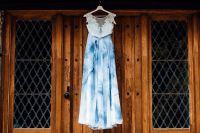
It can’t be traced when the tradition of blue wedding dresses started in Ireland. All that we know is that blue has always been associated with purity during the early times around here, which is the main reason why brides loved to wear blue wedding dresses! There are so many stories trying to explain why blue wedding dresses are very popular. Some links the preference to Críostóir Mac Cárthaigh’s very old rhyme with the line “Married in blue, you’re sure to be true,” while some connects it to the tradition of “something old, something new, something borrowed, something blue.” Whatever the true roots of this tradition is, the color blue has long been associated with purity, love, and fidelity. It’s not surprising why Irish brides chose this colour over the usual white wedding dress.
The horseshoe

Some centuries back, there was a tradition in Ireland where the bride carries a horseshoe as she walks down the aisle. Although this is not observed widely by all couples getting married in Ireland, this can be a good addition to your wedding ceremony. The horseshoe symbolises fertility because of its shape, which means blessings through children in the old times. Aside from the gift of giving birth, a horseshoe generally symbolises good luck that's why brides and grooms in Ireland include this as part of their wedding tradition even up to now. If ever you opt to have this symbol in your elopement in Ireland, you can take the horseshoe home after the ceremony and hang it on the door of your house.
Getting around Ireland
Ferries
One interesting way to get around Ireland is through ferries. Ireland is itself an island with it's very own islands! Some of these 'sub-islands' are populated, like the Aran Islands, and others are now uninhabited, like the Blasket Islands. There are more or less 20 islands all over the country with ports that are served by ferries, namely the Blasket Islands, Aran Islands, Saltee Islands, Clear Island, Long Island, and Inisheer, among others. You will surely find interesting spots to explore and even get married at in almost all these islands, like shingle beaches, historic castle ruins, wild flora and fauna, and more! Also, surprisingly, riding ferries to cross rivers will cut down on travel time so it can really be a legit option if you’re on a tight schedule.
Buses
Among the three modes of transportation - car rental, train ride, and bus travel - this third option is the cheapest way of getting around Ireland. Riding a bus can be the best way to maximize your honeymoon travel plans here if you have the luxury of time for long-haul trips. In fact, the bus network in Ireland is much more comprehensive than the train system. It’s also very convenient because you can buy bus tickets online in advance. Just take note that bus trips to small towns and villages are less frequent than trips to the bigger cities. City buses are also more advanced than the local town buses so don’t expect WiFi connection from the local buses. Better to plan your destinations carefully and buy bus tickets in advance If you’ll choose bus trips to get around Ireland. This will save you from inconveniences and unexpected delays.
Train system
The Irish train system is not as extensive compared to other European countries since there’s lesser number of tourists and locals traveling here. You can also expect a lower frequency of service, which makes it not ideal to ride the train to get to the off-the-beaten-track locations in Ireland. Nevertheless, traveling through the train system is a lot cheaper than renting a car. If you want a deeper exploration of Ireland but would like to travel by rail, you can go down on the train stations then ride a bus to get to the less popular villages and towns in Ireland. After all, it’s lovely to see the rolling hills, flower fields, and the scenic landscapes of Ireland when you travel long distances via train. Just make sure you reserve seats online or you arrive at the station at least half an hour before departure or you’ll have to stand for your journey!
Car rental
The best way to explore Ireland, from its popular tourist spots to its hidden gems located in rural villages, is by renting a car. Freeways have a maximum of two to three lanes, so they are comfortable to navigate for ordinary drivers. Country roads on the other hand require better driving skills because of their old surfaces, some potholes, and obstacles like farm tractors and animals crossing. This is the cost of witnessing the lovely views of Ireland’s picturesque landscapes as you drive along the country roads. For couples who have the luxury of time to discover Ireland up close, you can go for car rental but note that it can be the most expensive option too. High car rental fees can be attributed to the expensive insurance cost especially for younger couples at the age of 21 or below. If you want to evade these insurance fees, you must show a document issued by your US-based auto insurer confirming the extent of your insurance coverage.
How much does it cost to have a micro wedding in Ireland?
The simple answer to this is ‘it depends.’ You can have an elopement for two in Ireland and pay a minimum fee for the use of a public nature spot for your micro wedding. Or you can pay an exclusive rental fee for a castle wedding and have both the ceremony and the reception in one venue. Some packages include accommodation for you and your guests. In this section, we’ll not get down to details. You can contact our Irish planner and ask for a quote to know more about the cost of getting married here. We’ll just give you a glimpse of the wedding cost in Ireland and couch them in generic terms. The average rental fee for exclusive use of castles and manor houses range from €500 to €8500. Some of them include accommodations while some only have spots for the ceremony. If you’re planning to get married within July to August, expect venue prices to be at their peak because this is the traditional holiday season in Ireland. All these are just generic details but you can get a better gauge of your wedding budget when you ask for a quote from our dedicated Irish planner.
Frequently Asked Questions
For information about our services, payment terms and more - check our FAQ page
